- Home
- Salman Rushdie
Shame Page 10
Shame Read online
Page 10
There’s an apocryphal story that Napier, after a successful campaign in what is now the south of Pakistan, sent back to England the guilty, one-word message, ‘Peccavi’. I have Sind. I’m tempted to name my looking-glass Pakistan in honour of this bilingual (and fictional, because never really uttered) pun. Let it be Peccavistan.
It was the day on which the only son of the future General Raza Hyder was going to be reincarnated.
Bilquìs had moved out of Bariamma’s contraceptive presence into a simple residence for married officers and wives in the compound of the Army base; and not long after her escape she had conceived, just as prophesied. ‘What did I say?’ she triumphed, ‘Raz, he’s coming back, the little angel, just you wait and see.’ Bilquìs put her new-found fertility down to the fact that she was finally able to make a noise during their lovemaking, ‘so that the little angel, waiting to be born, can hear what’s going on and respond accordingly,’ she told her husband fondly, and the happiness of the remark prevented him from replying that it was not only angels who were within earshot of her passionate love-moans and ululations, but also every other married officer on the base, including his immediate superior and also some junior chaps, so that he had been obliged to put up with a fair amount of raillery in the mess.
Bilquìs entered labour – the rebirth was imminent – Raza Hyder awaited it, stiffly seated in an anteroom of the military hospital’s maternity ward. And after eight hours of howling and heaving and bursting blood-vessels in her cheeks and using the filthy language that is permitted to ladies only during parturition, at last, pop! she managed it, the miracle of life. Raza Hyder’s daughter was born at two-fifteen in the afternoon, and born, what’s more, as vivaciously alive and kicking as her big brother had been dead.
When the swaddled child was handed to Bilquìs, that lady could not forbear to cry, faintly, ‘Is that all, my God? So much huffery and puffery to push out only this mouse?’
The heroine of our story, the wrong miracle, Sufiya Zinobia, was as small a baby as anyone had ever seen. (She remained small when she grew up, taking after her near-midget paternal great-grandmother, whose name, Bariamma, Big Mother, had always been a sort of family joke.)
A surprisingly small bundle was returned by Bilquìs to the midwife, who bore it out to the anxious father. ‘A daughter, Major Sahib, and so beautiful, like the day, dontyouthinkso?’ In the delivery room, silence flooded from the pores of the exhausted mother; in the anteroom, Raza was quiet, too. Silence: the ancient language of defeat.
Defeat? But this was Old Razor Guts himself, conqueror of glaciers, vanquisher of frosty meadows and ice-fleeced mountain sheep! Was the future strong-man of the nation so easily crushed? Not a bit of it. Did the midwife’s bombshell lead to unconditional surrender? Certainly not. Raza began to argue; and the words came in rushes, inexorable as tanks. The walls of the hospital shook and retreated; horses shied, unseating riders, on the nearby polo fields.
‘Mistakes are often made!’ Raza shouted. ‘Terrible blunders are not unknown! Why, my own fifth cousin by marriage when he was born …! But me no buts, woman, I demand to see the hospital supervisor!’
And even louder: ‘Babies do not come clean into this world!’
And blasted from his lips like cannonballs: ‘Genitalia! Can! Be! Obscured!’
Raza Hyder raging roaring. The midwife stiffened, saluted; this was a military hospital, don’t forget, and Raza outranked her, so she admitted yes, what the Major Sahib was saying was possible certainly. And fled. Hope rose in the moist eyes of the father, also in the dilated pupils of Bilquìs, who had heard the noise, of course. And now it was the baby, its very essence in doubt, who fell silent and began to muse.
The supervisor (a Brigadier) entered the quaking room in which the future President was trying to affect biology by a superhuman act of will. His words, weighty, final, outranking Raza’s murdered hope. The stillborn son died again, even his ghost snuffed out by the medico’s fatal speech: ‘No possibility of error. Please to note that the child has been washed. Prior to swaddling procedure. Matter of sex is beyond dispute. Permit me to tender my congratulations.’ But what father would allow his son, twice-conceived, to be executed thus, without a fight? Raza tore away swaddling cloth; having penetrated to the baby within, he jabbed at its nether zones: ‘There! I ask you, sir, what is that?’ – ‘We see here the expected configuration, also the not uncommon postnatal swelling, of the female …’ – ‘A bump!’ Raza shrieked hopelessly. ‘Is it not, doctor, an absolute and unquestionable bump?’
But the Brigadier had left the room.
‘And at this point’ – I am quoting from the family legend again – ‘when her parents had to admit the immutability of her gender, to submit, as faith demands, to God; at this very instant the extremely new and soporific being in Raza’s arms began – it’s true! – to blush.’
O rubescent Sufiya Zinobia!
It is possible that the above incident has been a little embellished during its many tellings and retellings; but I shall not be the one to question the veracity of oral tradition. They say the baby blushed at birth.
Then, even then, she was too easily shamed.
6
AFFAIRS OF HONOUR
There is a saying that the frog who croaks in the shaft of a well will be frightened by the booming voice of the giant frog who answers him.
When the great gas fields were discovered in Needle Valley in the district of Q., the unpatriotic behaviour of the intemperate local tribals became a matter for national concern. After the team of drilling engineers, surveyors and gas scientists which was sent to Needle to plan the construction of the butane mines had been attacked by the tribals, who raped each member of the team eighteen point six times on average (of which thirteen point nine seven assaults were from the rear and only four point six nine in the mouth) before slitting one hundred per cent of the expert gullets, the State Chief Minister Aladdin Gichki requested military assistance. The commander of the forces appointed for the protection of the invaluable gas resources was none other than Raza Hyder, hero of the Aansu-ki-Wadi expedition, and already a full Colonel. It was a popular appointment. ‘Who better to defend one precious mountain valley,’ the nation’s premier daily paper War rhetorically inquired, ‘than the conqueror of another such jewel?’ Old Razor Guts himself made the following statement, to a reporter from the same journal, on the steps of the newly air-conditioned mail train to the west: ‘These brigands are the frogs in the well, good sir, and, God willing, I intend to be the giant who scares off their pants.’
At that time his daughter Sufiya Zinobia was fifteen months old. She, and his wife Bilquìs, accompanied Colonel Hyder on his journey towards the Impossible Mountains. And no sooner had their train pulled out of the station than sounds of ‘Godless carousing’ (Raza’s phrase) began to filter into their compartment. Raza asked the guard for the identities of his neighbours. ‘Very big persons, sir,’ was the reply, ‘certain executives and also lady stars of a famous bioscope company.’ Raza Hyder shrugged. ‘Then we must put up with the racket, because I will not lower myself by disputing with filmi types.’ When she heard this Bilquìs set her lips in a tight and bloodless smile, and her eyes stared ferociously through the mirror on the wall which divided her from the empires of her past.
The carriage was a new model with a corridor running past the compartment doors, and a few hours later Bilquìs was returning from the Ladies when a youth with lips as fat as Iskander Harappa’s leaned out of the depraved compartment of the cinema people and made kissing noises at her, whispering whiskied endearments: ‘I swear, yaar, you can keep your goods from foreign, the home produce is the best, no question.’ Bilquìs could feel his eyes squeezing her breasts, but for some unaccountable reason she did not mention this insult to her honour when she returned to her husband’s side.
Raza Hyder’s honour also received an insulting blow on that trip, or, to be precise, at its conclusion, because when they arrived at the Cantt s
tation in Q. they found a crowd of locust proportions awaiting them on the platform, singing hit songs and throwing flowers and waving banners and flags of welcome, and although Bilquìs could see Raza twirling his moustache her smiling lips never moved to warn him of the obvious truth, which was that the welcome was not for the Colonel but for the cheap riff-raff next door. Hyder descended from the train with arms spread wide and a speech guaranteeing the safety of the crucial gas seams dripping from his lips, and was almost knocked over by the rush of autograph hunters and hem-kissers towards the demure lady actresses. (Off balance, he failed to notice a fat-lipped youth wiggling his fingers in farewell in the direction of Bilquìs.) The injury sustained here by his pride explained much of what followed; in the illogical manner of the humiliated, he began taking it out on his wife, who shared a bioscopic background with his adversaries – whereupon his rage at the botched reincarnation of his only son awoke again, and crossed over the newly-established bridge between his wife and the cinema fans, until Raza began, unconsciously, to hold his progenitorial difficulties against the shallow moviegoers of Q.
Trouble in a marriage is like monsoon water accumulating on a flat roof. You don’t realize it’s up there, but it gets heavier and heavier, until one day, with a great crash, the whole roof falls in on your head … leaving Sindbad Mengal, the kiss-lipped boy who was the youngest son of the president of the bioscope corporation, and who had arrived to take charge of cinematic activity in that region, making promises of weekly programme changes, new picture palaces, and regular personal appearances by top stars and playback singers, the Hyders packed away their own assurances of triumph and pushed their way out of the station through the rejoicing crowd.
At Flashman’s Hotel, they were shown into a honeymoon suite which smelled oppressively of naphthalene balls by an enfeebled bearer who was accompanied by the last of the trained monkeys in bellhop uniform, and who could not, in the depths of his despair, resist touching Raza Hyder on the arm and inquiring, ‘Please, great sir, do you know, when are the Angrez sahibs coming back?’
And Rani Harappa?
Wherever she looks are peering faces; wherever she listens, voices, using a vocabulary of such multicoloured obscenity that it dyes her listening ears in rainbow colours. She wakes up one morning soon after her arrival at her new home to find peasant girls rummaging through her clothes drawers, taking out and holding up lacy imported lingerie, examining ruby lipsticks. ‘What do you think you’re doing?’ – The two girls, unashamed, turn to stare, still holding garments, cosmetics, combs. ‘O, Isky’s wife, nothing to worry, Isky’s ayah said to look.’ ‘We polished floors and so she gave permission.’ ‘Ohé, Isky’s wife, look out on those floors we polished! Slipperier than a monkey’s bottom, I swear.’ – Rani rises to her elbows in bed; her voice fights off sleep. ‘Get out! Don’t you blush to be here? Go on, flee before I.’ The girls fan themselves as if a fire were blazing in the room. ‘O, God, too hot!’ ‘Hey, Isky’s wife, dip your tongue in water!’ She shouts, ‘Don’t be insol …’, but they interrupt. ‘Never mind all that, lady, in this house it’s still what Isky’s ayah says.’ The girls move, wiggling cheeky hips, towards the door. And pause in the doorway for a parting shot: ‘Shit, but Isky gives his wife good clothes, the best of everything, no mistake.’ ‘That is true. But if a peacock dances in the jungle, there is nobody to see its tail.’
‘And tell Isky’s – tell the ayah I want to see my daughter,’ she cries, but the girls have closed the door, and one of them shouts through it, ‘Why be so high and mighty? The child will come when she’s ready.’
Rani Harappa no longer weeps, no longer tells her mirror This can’t be happening or sighs with inaccurate nostalgia for the dormitory of the forty thieves. Plus daughter, minus husband, she is stranded in this backyard of the universe: Mohenjo, the Harappa country estate in Sind, stretching from horizon to horizon, afflicted by a chronic water shortage, populated by laughing scornful monsters, ‘Frankensteins, absolutely.’ She no longer imagines that Iskander does not know how she is treated here. ‘He knows,’ she says to her mirror. Her beloved husband, her groom on the golden plate. ‘A woman becomes looser after having a child,’ she confides to the glass, ‘and my Isky, he likes things tight.’ Then her hand covers her lips and she runs to door and windows to make sure nobody has heard.
Later, she sits in shalwar and kurta of Italian crêpe-de-chine on the coolest porch, embroidering a shawl, watching a little dust cloud on the horizon. No, how can it be Isky, he is in town with his bosom pal Shakil; I knew trouble, knew it the moment I saw him, the fat pigmeat tub. Probably just one of those little whirl-winds that skip across the scrub.
Mohenjo earth is obstinate. It bakes its people hard as rocks in the heat. The horses in the stables are made of iron, the cattle have diamond bones. The birds here beak up clods of earth, spit, build nests out of mud; there are few trees, except in the little haunted wood, where even the iron horses bolt … an owl, while Rani embroiders, lies sleeping in a burrow in the ground. Only a wingtip can be seen.
‘If I was murdered here, the news would never leave the estate.’ Rani is uncertain whether or not she has spoken aloud. Her thoughts, loosened by solitude, often burst these days through her unconscious lips; and often contradict one another, because the very next notion to form in her mind as she sits on the heavy-eaved verandah is this: ‘I love the house.’
Verandahs run along all four walls; a long covered mosquito-netted walkway joins the house to the kitchen bungalow. It is one of the miracles of the place that chapatis do not cool down on their journey along this wood-floored avenue to the dining hall; nor do soufflés ever fall. And oil paintings and chandeliers and high ceilings and a flat tar-macadamed roof upon which, once, before he abandoned her there, she knelt giggling through a morning skylight at her husband still in bed. Iskander Harappa’s family home. ‘At least I have this piece of him, this soil, his first place. Bilquìs, what a shameless person I must be, to settle for such a small part of my man.’ And Bilquìs, on the telephone from Q.: ‘Maybe it’s O.K. for you, darling, but I could never put up with it, no sir, anyway my Raza is away at the gas, but spare me your sympathy, dear, when he comes home he may be tired as hell but never so tired, you understand what I mean.’
The dust cloud has reached Mir Village now, so it is a visitor and not a whirlwind. She tries to suppress her excitement. The village bears the name of Iskander’s father, Sir Mir Harappa, now deceased, once proudly knighted by the Angrez authorities for services rendered. The birdshit is cleaned off his equestrian statue every day. Sir Mir in stone gazes with equal hauteur upon village hospital and brothel, the epitome of an enlightened zamindar … ‘A visitor.’ She claps her hands, rings a bell. Nothing. Until at length Isky’s ayah, a heavy-boned woman with soft uncallused hands, brings out a jug of pomegranate water. ‘No need to make such noise, Isky’s wife, your husband’s household knows how to entertain.’ Behind the ayah is old Gulbaba, deaf, half-blind, and behind him a trail of spilled pistachio nuts leading to the half-empty dish in his hands. ‘O God your servants darling,’ Bilquìs has offered long-distance views, ‘all those fogey types left over from five hundred years ago. I swear you should take them to the doctor and give the painless injections. What you put up with! Queen by name, you must make yourself queen by fame.’
She rocks in her verandah chair, the needle moving unhurriedly, and feels the youth and gaiety being crushed out of her, drop by drop, by the pressure of the passing moments, and then the horsemen ride into the courtyard and she recognizes Iskander’s cousin, Little Mir Harappa from the Daro estate that begins just over the northern horizon. In these parts horizons serve as boundary fences.
‘Rani Begum,’ Little Mir shouts from horseback, ‘no point you blaming me for this. Blame your husband, you should keep him on a tighter rein. Excuse me, but the fellow’s a real motherfucker, he’s got me all worked up.’
A dozen armed horsemen dismount and begin to loot the house, while M
ir wheels and rears his mount and hurls justifications at his cousin’s wife, in the throes of a giddy, neighing frenzy that sets his tongue free of all constraints. ‘What do you know about that bullock’s arsehole, madam? Fuck me in the mouth, but I know. That pizzle of a homosexual pig. Ask the villagers how his great father locked up his wife and spent every night in the brothel, how a whore disappeared when her fat stomach couldn’t be explained by what she ate, and then the next thing Lady Harappa was holding the baby even though everyone knew she hadn’t been screwed in a decade. Like father, like son, my honest opinion, sorry if you don’t like it. Sisterfucking bastard spawn of corpse-eating vultures. Does he think he can insult me in public and get away with it? Who is the elder, me or that sucker of shit from the rectums of diseased donkeys? Who is the bigger landowner, me or him with his six inches of land on which even the lice cannot grow fat? You tell him who is king in these parts. Tell him who can do what he likes round here, and that he should come crawling to kiss my feet like a murdering rapist of his own grandmother and beg for pardon. That nibbler of a crow’s left nipple. This day shows him who’s the boss.’
Looters cut from gilded frames paintings of the school of Rubens; Sheraton chairs have their legs amputated. Antique silver is placed in worn old saddle-bags. Cut-glass decanters splinter on thousand-knot carpets. She, Rani, goes on with her embroidery in the midst of the punitive riot. The old servants, the ayah, Gulbaba, the polishing girls, syces, villagers from Mir Village stand and watch, squat and listen. Little Mir, a proud equestrian figure, the tall hawkish avatar of the statue in the village, does not fall silent until his men are back upon their horses. ‘A man’s honour is in his women,’ he shouts. ‘So when he took that whore from me he took my honour, tell him that, the little jumped-up piss drinker. Tell him about the frog in the well, and how the giant frog replied. Tell him to be afraid and to think himself lucky I am a mild-mannered man. I could have regained my honour by depriving him of his. Lady, I could do to you anything, anything, and who would dare say no? Here it is my law, Mir’s law, that runs. Salaam aleikum.’ The dust of the departing horsemen settles on the surface of the untouched pomegranate water, then sinks to form a thick sediment at the bottom of the jug. ‘I just can’t tell him yet,’ Rani tells Bilquìs on the telephone. ‘It makes me feel too ashamed.’

 Shame
Shame The Enchantress of Florence
The Enchantress of Florence Imaginary Homelands: Essays and Criticism 1981-1991
Imaginary Homelands: Essays and Criticism 1981-1991 Joseph Anton: A Memoir
Joseph Anton: A Memoir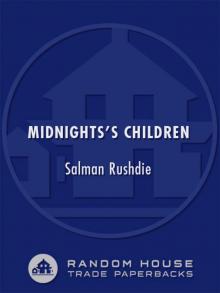 Midnight's Children
Midnight's Children East, West: Stories
East, West: Stories Luka and the Fire of Life
Luka and the Fire of Life Fury Fury Fury
Fury Fury Fury Haroun and the Sea of Stories
Haroun and the Sea of Stories Step Across This Line: Collected Nonfiction 1992-2002
Step Across This Line: Collected Nonfiction 1992-2002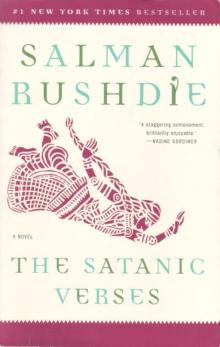 The Satanic Verses
The Satanic Verses The Moor's Last Sigh
The Moor's Last Sigh The Prophet's Hair
The Prophet's Hair The Ground Beneath Her Feet
The Ground Beneath Her Feet Two Years Eight Months and Twenty-Eight Nights
Two Years Eight Months and Twenty-Eight Nights Shalimar the Clown
Shalimar the Clown Grimus
Grimus The Duniazát
The Duniazát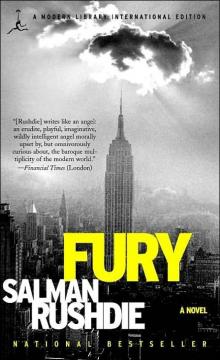 Fury
Fury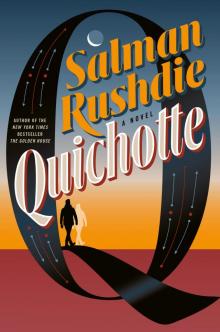 Quichotte
Quichotte The Jaguar Smile
The Jaguar Smile Joseph Anton
Joseph Anton Joseph Anton: A Memoir: A Memoir
Joseph Anton: A Memoir: A Memoir Imaginary Homelands
Imaginary Homelands The Satanic Verses: A Novel
The Satanic Verses: A Novel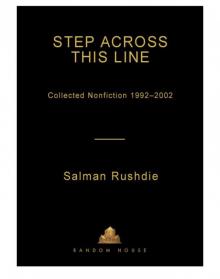 Step Across This Line
Step Across This Line East, West
East, West